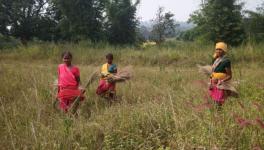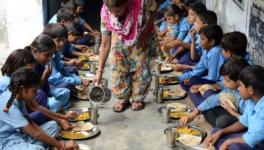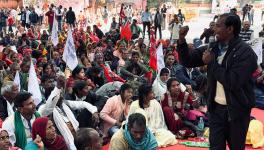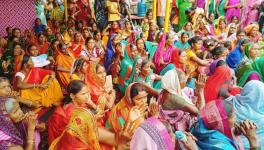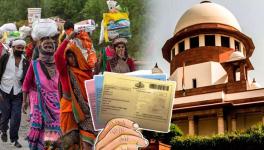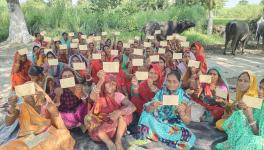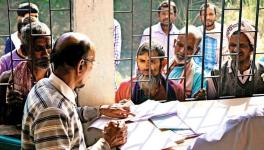Widow Dies of Starvation in Jharkhand Due to Aadhaar-Related Problems
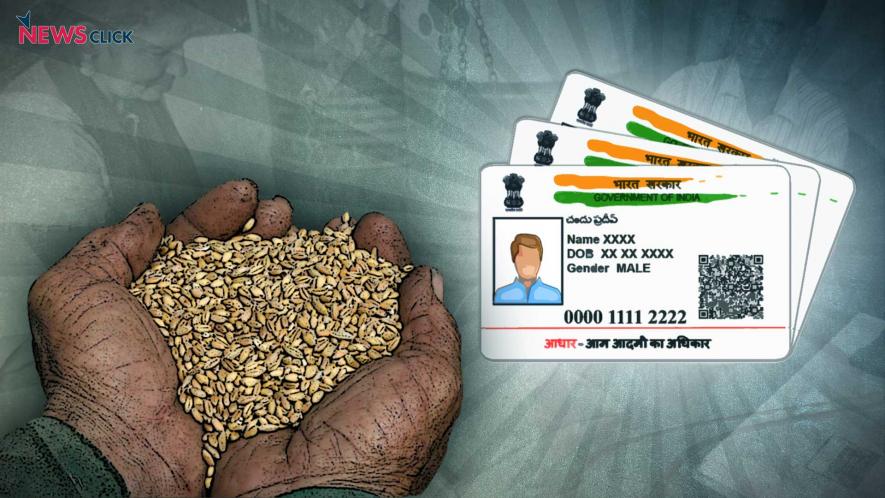
Newsclick Image by Nitesh Kumar
In yet another case of starvation death for want of Aadhar card resulting in denial of ration and pension to 64 year old Premani Kunwar of Danda block of Garhwa district in Jharkhand has been reported by “Right to Food Campaign’ based on their fact finding. Premani Kunwar was a widow who lived with her 13-year old son, and used to receive her monthly pension of Rs 600 in her Aadhaar-linked bank account at the State Bank of India. From October onwards, however, her pension was redirected to another account (in the name of Shanti Devi, her husband’s first wife), unbeknown to her or her family or the local bank. The reason is that Shanti Devi’s account (a suspicious account because she died 25 years ago) was somehow linked with Premani’s Aadhaar number. Under the current system of Aadhaar-enabled pension payments, a person’s pension is automatically paid to whichever of his/her accounts was mostly recently seeded with Aadhaar. But most people in rural Jharkhand are unaware of this rule, which is a source of endless confusion for pensioner and NREGA workers who do not know where to look for their money. Premani’s death epitomises their hardships.
Another example is the opening of Aadhaar-linked bank accounts (e.g. under Jan Dhan Yojana) without the consent or even knowledge of the concerned person. Sometimes bank accounts are opened in this casual manner by wholly unaccountable “business correspondents”.
In 2016, ICICI Bank opened accounts of around 6000 NREGA workers in Boram block of East Singhbhum district without their consent and linked them to their Aadhaar. Most of the workers did not know that their NREGA wages were being credited in the ICICI bank accounts. Shell accounts have also been used to siphon off NREGA wages, as a recent investigation in Mahuadanr Block (Latehar district, Jharkhand) revealed.
Similarly, Aadhaar numbers are sometimes “seeded” into existing bank accounts without verification, or without the knowledge of the account holders. This is a dangerous practice that opens the door to fraud.
The practice of automatically redirecting pensions or NREGA wages to the “last Aadhaar-linked account”, without informing the recipients, is particularly objectionable. Recently, a massive scam of opening Airtel payment bank accounts linked to Aadhaar of mobile subscribers of Airtel without their consent has been unearthed. It was found that LPG subsidy and other online payments were redirected to the Airtel accounts without the consent and knowledge of subscribers.
Denial of food rations
Premani who possessed Antodaya card was also deprived of her food rations (monthly quota of 35 kg of rice at Re 1/kg) from the local ration shop in August and November. In September, Premani had to use most of her food ration to return what she had borrowed in August to survive. In November, the dealer took her fingerprint (biometric authentication is compulsory for food rations in Jharkhand, in the online system) but told her that he would give her rice later. She died before the dealer gave her the ration.
The Right to Food Campaign states that “These irregularities are directly related to Aadhaar. The reason why there was no distribution in August is that local dealers were not allotted any rice for that month. Instead, they were told that they should distribute from the accumulated stocks that had been generated in preceding months due to transaction failures (e.g. due to lack of connectivity or biometric failures). Meanwhile, however, many dealers had sold these stocks in the market. So in August they simply told the cardholders that they had nothing to distribute.”
In addition, dealers tampered with digital records in order to hide accumulated stocks. One way they do this is to separate authentication and distribution – get people’s fingerprints, tell them that they would get rice later, and then play hide-and-seek. This seems to be what happened to Premani in November.
Circumstances of death
Deprived of both food and cash, Premani lived in a state of semi-starvation from August (if not before). Sometimes her son brought leftover rice from the midday meal at school, but there was little else to eat most of the time. Before she died, she had gone without proper food for 15 days. No food could be cooked in her house for eight days preceding her death for want of ration.
Continuing denial by the government
Meanwhile even as Premani’s death adds to the growing evidence of violation of right to life of people in Jharkhand caused by the Central and state government’s drive to link delivery of welfare services with Aadhaar, the state government continues to deny that starvation is still a reality in Jharkhand.
Get the latest reports & analysis with people's perspective on Protests, movements & deep analytical videos, discussions of the current affairs in your Telegram app. Subscribe to NewsClick's Telegram channel & get Real-Time updates on stories, as they get published on our website.









